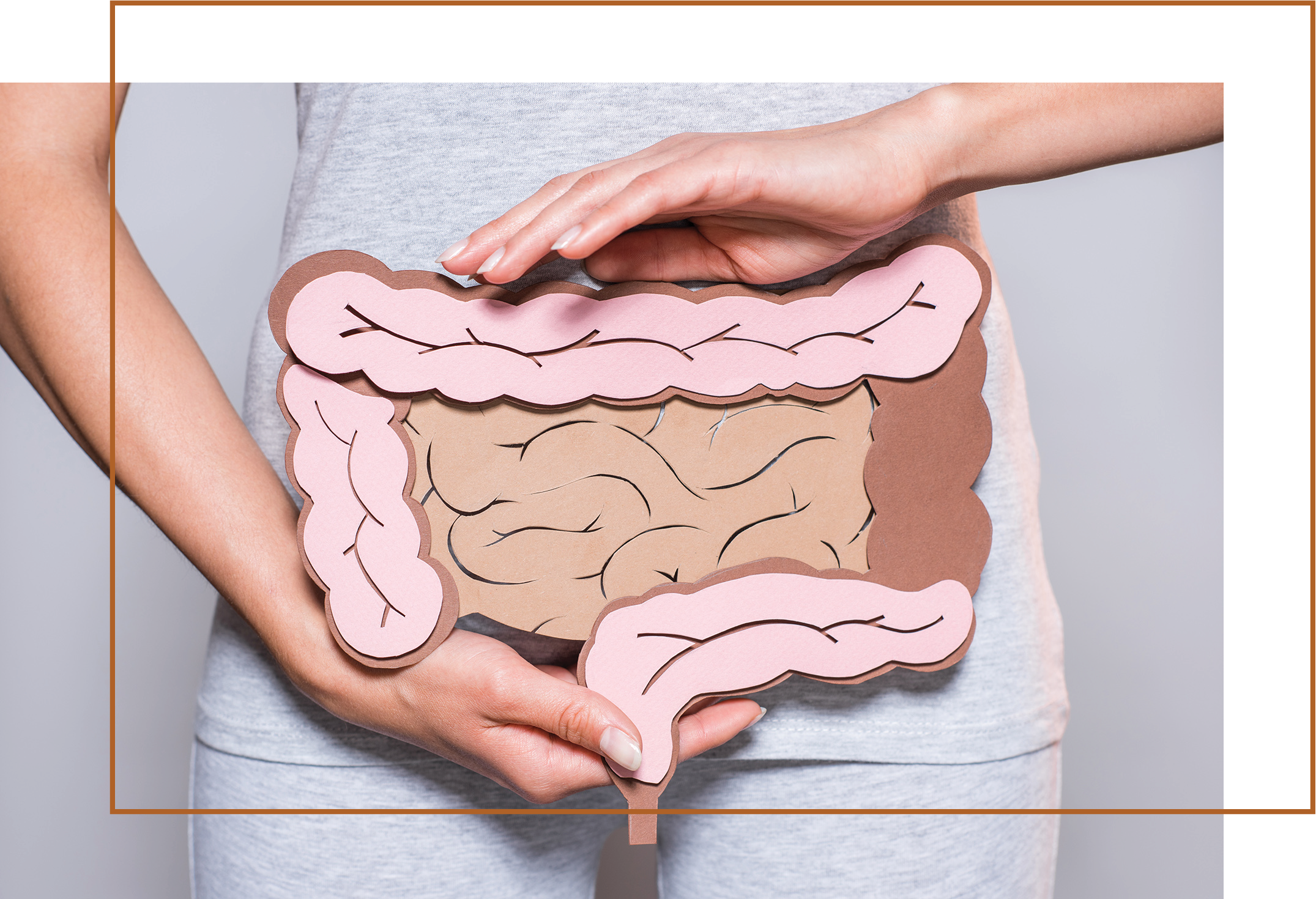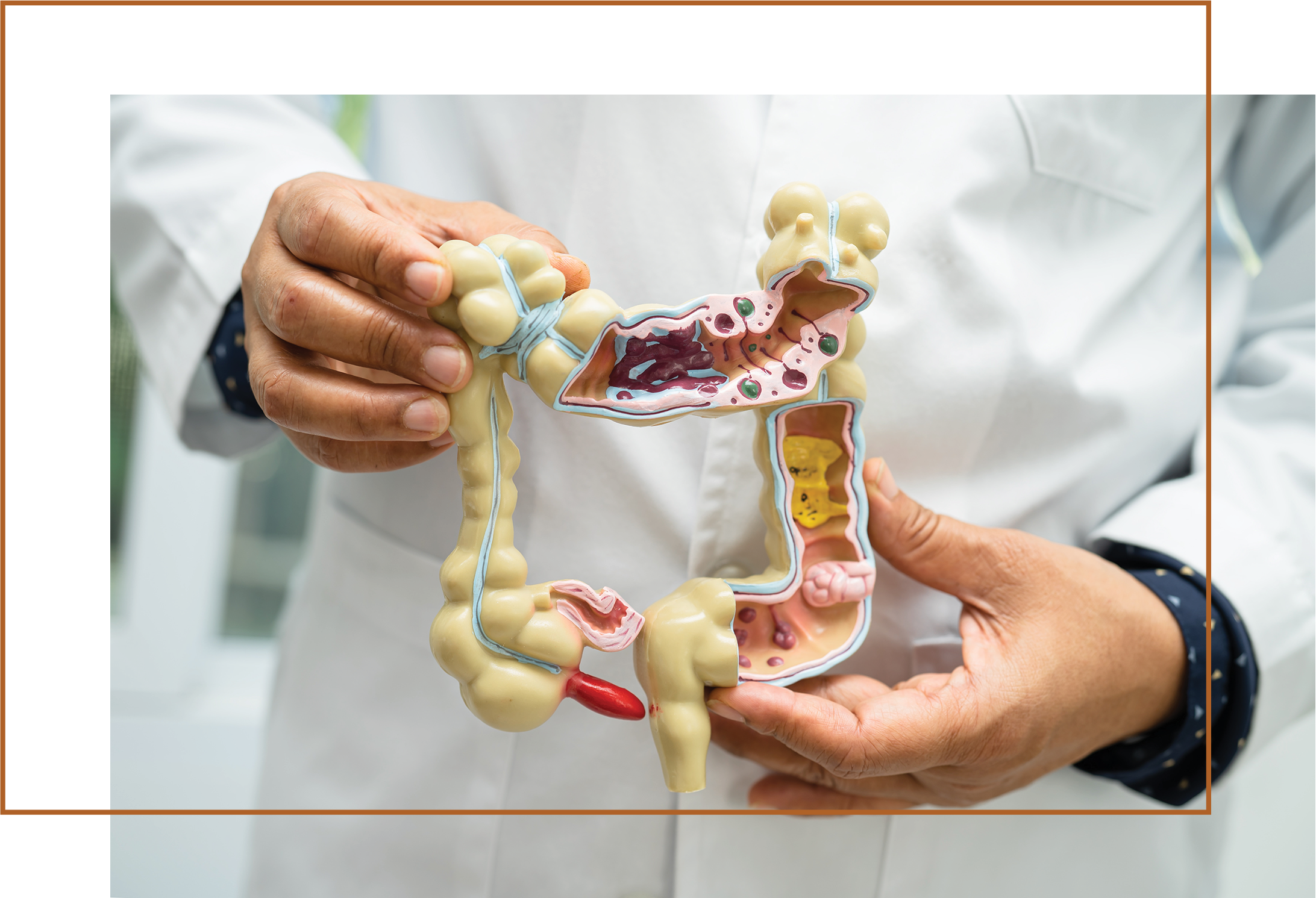MucosaGenic
Gut Lining Restorer
Repairs and maintains the intestinal and mucosal lining through nutrigenomic ingredients that enhance the healthy expression of tight junction protein genes, mucin genes, and inflammation genes.
Repairs and maintains the intestinal and mucosal lining through nutrigenomic ingredients that enhance the healthy expression of tight junction protein genes, mucin genes, and inflammation genes.
Take 2 capsules daily, with or without food, or as directed by your health care provider.
**Individual needs may vary; please consult your practitioner before altering the prescribed doses or protocols.

Chronic increase of intestinal permeability or intestinal hyperpermeability is often referred to as “leaky gut syndrome” or “intestinal barrier dysfunction.” This is a condition where the lining of the small intestine becomes excessively porous. In a healthy gut, the intestinal lining acts as a barrier, allowing essential nutrients to be absorbed into the bloodstream while preventing harmful substances such as bacteria, toxins, and undigested food particles from crossing into the bloodstream. When the intestinal lining becomes more permeable, these harmful substances can pass through, triggering an immediate immune response and inflammation. If intestinal hyperpermeability persists, it can lead to chronic inflammation and potentially contribute to autoimmune conditions. Therefore, addressing this condition is crucial for maintaining immune integrity and response.

Genetic expression significantly influences an individual’s susceptibility to intestinal permeability, but this susceptibility is determined by a complex interplay between genetics and environmental factors. In today’s world, environmental factors such as poor diet, infections, medications, food sensitivities, chronic inflammation, toxins, inadequate sleep, and stress, make us more susceptible to gut issues. A “leaky gut” can lead to complications like malnutrition, compromised immune function, autoimmune diseases, mental health issues, metabolic disorders, skin conditions, and gastrointestinal problems such as gas, bloating, cramps, constipation, and diarrhea.
MucosaGenic was developed using over 15 years of research and recent discoveries to create a formula that not only directly heals the gut lining but also manages genes essential for the body’s ability to repair tight junctions and mucosal linings.
MucosaGenic promotes a balanced inflammatory response in the gastrointestinal (GI) tract, comforts the mucous membranes of the GI tract, and sustains colonic permeability and regular bowel function. This helps prevent the passage of unwanted substances into the bloodstream, reducing inflammation, immune complications, and supporting overall gut health. Additionally, a rejuvenated mucosal layer can contribute to a balanced and thriving microbiome, fostering the growth of beneficial bacteria that play a crucial role in optimizing digestion, immunity, cognitive performance, hormones, and whole body functions.
Histamine intolerance begins in the gut. A healthy gut lining is vital for the efficient production of essential enzymes like lactase and DAO (diamine oxidase). Lactase degrades lactose from milk, while DAO degrades histamines produced by the body and consumed through diet. The integrity of intestinal cells and a robust mucosal lining support the synthesis of these enzymes. When the gut lining is undamaged and resilient, enzymes are produced more effectively, contributing to improved nutrient absorption, less food sensitivity, and overall digestive efficiency.1
Emerging research suggests a strong connection between gut health and mental well-being. A healthy gut contributes to better mental health and cognitive function, likely through the prevention of chronic low-grade inflammation, which has recently been coined with the term 'inflammaging.' Conversely, a leaky gut has been implicated in conditions like ‘leaky brain’, which may contribute to cognitive issues and mood disorders.2
The gut is a significant part of the immune system. A well-functioning gut barrier prevents the escape of harmful pathogens and substances out of the gut and into the surrounding tissues or bloodstream. By keeping these pathogens and substances in a place equipped to handle them, a healthy gut also provides a place for the immune system to be educated in a safe way that doesn’t cause illness or over-reaction. This education supports the immune system's ability to distinguish between friend and foe, priming it to prevent infections and autoimmune responses.3
A compromised mucosal layer allows stomach acid and other digestive fluids to escape the stomach and enter the esophagus, causing symptoms like heartburn and acid reflux. By repairing the integrity of the gut lining and supporting the mucosal layer of the stomach, the likelihood of such irritants escaping the digestive tract is reduced, alleviating reflux problems and promoting better digestive health.4
New information is acquired every day on the intricacies of how the intestine is regulated on a cellular level, how heavily the immune system is involved in the intestine, and how beneficial microbes are required for this process to function at its best. With this exponential growth in knowledge, MucosaGenic aims to keep astride the newest information to provide a product that targets the root cause of intestinal barrier issues through the support of proper genetic expression and functional proteins.
There are several types of genes that encode tight junction proteins, such as TJP genes, CLDN genes, and OCLN genes, which respectively code for zonula occluden (ZO) proteins, claudin proteins, and occludin proteins. These are all crucial for maintaining the integrity of the intestinal barrier. They work by creating a structure that attaches cells together. This attachment should be tight enough that not even single atoms can leak through, unless proper signaling occurs to allow necessary passage of things like water or important ions. However, mutations or variations in these genes can create proteins that don’t work effectively, which can lead to impaired barrier function.
Mucin genes encode a family of related proteins that are further modified by attaching large amounts of carbohydrate molecules to them. This molecular structure creates a jelly-like mucous substance known as mucin that lines the gastrointestinal tract. Mucin provides protection for the delicate cells that line the intestine and serve as a home for beneficial bacteria to thrive. Variations in mucin genes can influence the effectiveness of the mucosal barrier.
The lining of the intestine, named the intestinal epithelium, is a thin layer of cells where the critical tight junctions are located. The entire intestinal epithelium is replaced every three to four days to maintain the integrity of the intestinal barrier. Regenerating the intestinal epithelium is a highly regulated and complex process that involves many genes and cellular signaling processes. Genes such as LGR5, ASCL2, and CLU are crucial for regulating this process primarily through the WNT pathway, which stimulates the differentiation of stem cells into new intestinal epithelial cells. This process must occur without leaving the intestinal barrier vulnerable or disrupting the mucosal barrier. When these genes or other supporting genes have mutations, this process can be inefficient, leading to complications such as leaky gut.5
Genes involved in the production and regulation of inflammatory mediators, such as cytokines (e.g., TNF-alpha, IL-6), can influence the inflammatory response in the gut. Dysregulation of these genes can contribute to intestinal inflammation. If this inflammation becomes chronic, it can impede the ability of tight junctions to function appropriately, leading to increased permeability.
Studies show that certain phytonutrients can support the body’s normal processes for regulating and repairing the lining of the gut. By regulating many important genes, the nutrients in MucosaGenic provide protective and healing molecules. One example is by upregulating the tight junction protein claudin and downregulating the protein zonulin.6,7 Other studies reveal that short-chain fatty acids (SCFA), flavonoids, growth factors, and phytochemicals such as berberine, are powerful influences for healthy GI tract integrity, preserving the integrity of the epithelial barrier.

TUDCA is a modified form of bile acid that is only produced by key gut bacteria. It is integral to the digestion of fats and oils, as well as for the detoxification of the gut and liver. At the cellular level, TUDCA transports helpful molecules into the cell and helps protect against cell degradation and apoptosis. It also assists in clearing cellular debris from the mitochondria and cell membrane. Additionally, it enhances the expression of tight-junction genes, which is crucial in protecting the gut barrier. In the microbiome, it improves gut bacteria diversity. Systemically, it has been shown to support brain and eye health.8–10
Studies have demonstrated that zinc L-carnosine exerts its effects in many ways. Genetically, it regulates the expression of nuclear factor-kappa B (NF-κB) in macrophages within the colonic mucosa. It also exhibits the capability to suppress the expression of key pro-inflammatory cytokines such as interleukin (IL)-6, IL-8, and tumor necrosis factor (TNF)-α in damaged gastric mucosa. Zinc L-carnosine also diminishes mucosal mRNA expression associated with cytokines like IL-1β, IL-2, IL-6, interferon (IFN)-γ, and TNF-α. This allows it to aid in healing gastrointestinal ulcers and overall damaged gut barriers caused by chronic inflammation.11
Glutamine deprivation upregulates the PI3K/AKT pathway, which in turn, reduces the abundance of the tight junction protein claudin-1, resulting in barrier function breakdown. Because of this, taking glutamine promotes intestinal development, regulates tight junction protein expression for healing, preserves intestinal immunity, and inhibits intestinal cell damage induced by oxidative stress or allergens.12
Genistein is a phytonutrient that has been shown to influence the expression and function of tight junction proteins, which are critical for maintaining the integrity of the gut barrier. Genistein may help strengthen these junctions, reducing the permeability of the intestinal lining. Additionally, genistein presents powerful anti-inflammatory effects in the intestine that can help with gastrointestinal issues associated with aging.13,14
Berberine supports the expression of tight junction genes, thus reinforcing a healthy gut barrier or repairing a damaged gut barrier. Research shows that it enhances the intestinal barrier through the ApoM/S1P pathway.15
A combination of calcium and butyrate in one.
Calcium consumption is required for tight junction proteins to function; without it, intestinal barrier integrity is greatly compromised. Additionally, calcium stimulates the secretion of the gastrointestinal hormone glucagon-like peptide 2 (GLP-2), which increases the expression of OCLN (occludin) and TJP1 (ZO-1) genes.16
Butyrate is a short-chain fatty acid that offers numerous benefits, including improving digestion and supporting the health and healing of cells in the small and large intestines. Short-chain fatty acids like butyric acid can help maintain a healthy and sealed gut lining, which can in turn help prevent and repair leaky gut syndrome. Additionally, butyrate increases the production of a protein called mucin 2 (MUC2). MUC2 is a crucial player in maintaining the gut barrier as it produces the mucin layer that lines and protects the delicate tissue of the gastrointestinal tract. When MUC2 and mucin production are boosted by butyrate, it can enhance the defense against detrimental substances in the gut.17
IgY, or immunoglobulin Y, is a type of antibody found in the yolks of bird eggs, typically chicken or duck eggs. IgY is particularly beneficial for gut health because it can target pathogens without taxing the immune system and does not cause an allergic response in mammals. It has been proposed as an additional option for treating infections to help limit the overuse of traditional pharmaceutical infection treatments.18,19
Grape seed decreases inflammation and improves intestinal barrier integrity by restoring the expression of tight junction genes, which increases levels of ZO1, occludin, and claudin proteins. Additionally, it suppresses the expression of pro-inflammatory cytokines and promotes the expression of anti-inflammatory cytokines to manage the intestinal lining.20
Aloe vera supplementation protects the gut lining by enhancing the intestinal tight junction protein ZO-1 through the activation of the MAPK/ERK signaling pathway.21
Acetic acid from apple cider vinegar maintains intestinal barrier function by increasing the expression of tight junction proteins, such as occludin, ZO-1, and others, to repair tight junctions in the intestine. It is suggested that it may even provide a stronger barrier by influencing the way these proteins are arranged.22
Arachidonic acid is a fatty acid found in high concentrations in the brain, muscles, liver, and cell membranes. It can be broken down into a compound belonging to a family of molecules known as eicosanoids. These molecules are biologically active and help to stimulate new cell growth, which is necessary to maintain intestinal integrity in the harsh environment that the gut lining is exposed to.23
Spearmint has traditional uses in medicine, one of the most common being to settle upset stomachs. Current research reports even more benefits, including its strong anti-inflammatory and antioxidant effects in the gut. It can also inhibit the growth of pathogens that can contribute to damaging the intestinal barrier.24
Licorice contains many phytonutrients, including flavonoids, that have the ability to protect against and heal wounds in the stomach and intestine, modulate the immune system, and calm gastrointestinal distress. It can stimulate the body to produce more mucin-secreting cells that line the gut and protect it from the acids and food waste that pass through it.25
When used as directed there are no known contraindications for MucosaGenic.
**It is always recommended that you consult your practitioner prior to adding any new supplement to your regimen if you are pregnant, breastfeeding, experiencing renal failure, undergoing an organ transplant(s), managing diabetes with insulin, or are taking medication(s) for any pre-existing conditions.**
All ingredients are tested before use for: